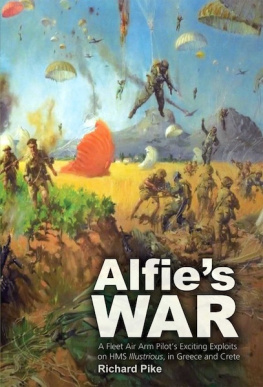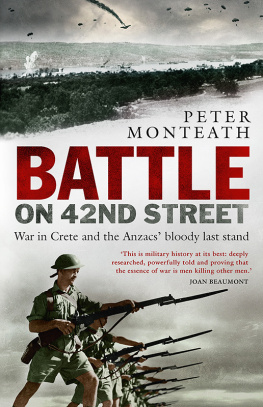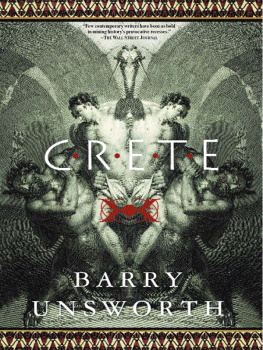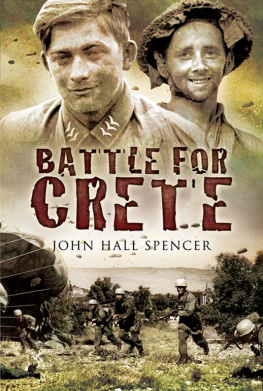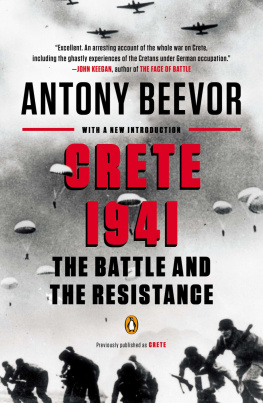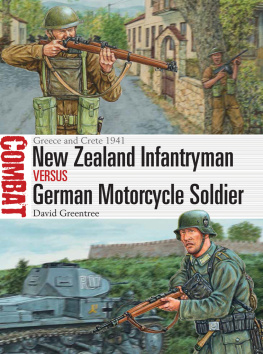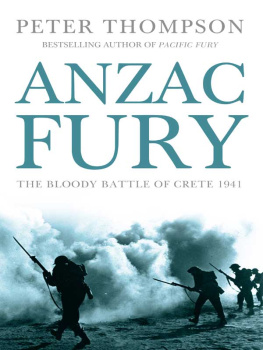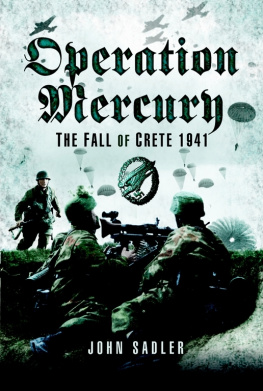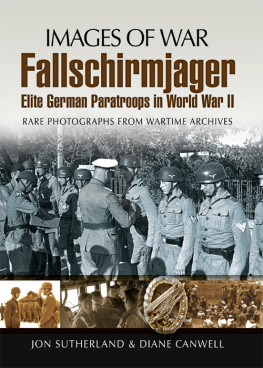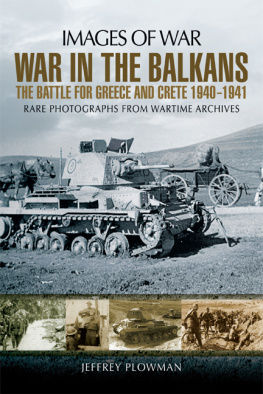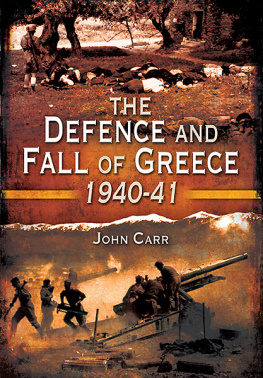
| Australian Army Campaigns Series 1 |
BATTLE OF CRETE
Revised and Expanded Second Edition
ALBERT PALAZZO
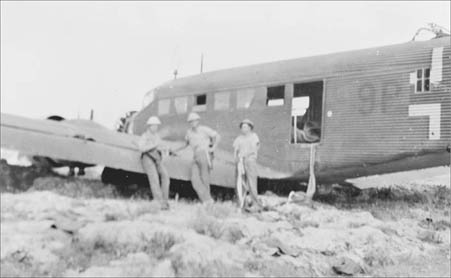

2011
Copyright
Army History Unit
Campbell Park Offices (CP4-2-31)
Canberra ACT 2600
AUSTRALIA
(02) 6266 4248
(02) 6266 4044 fax
Copyright Commonwealth of Australia
First published as ebook in 2005
Second edition published 2007
Reprinted 2011
This book is copyright. Apart from any fair dealing for the purposes of private study, research, criticism or review as permitted under the Copyright Act, no part may be reproduced, stored in a retrieval system or transmitted in any form or by any means, electronic, mechanical, photocopying, recording or otherwise, without written permission.
National Library of Australia
Cataloguing-in-Publication listing
Palazzo, Albert, 1957- .
Battle of Crete.
2nd ed.
Bibliography.
Includes index.
ISBN 9780980320411.
1. World War, 1939-1945 Campaigns Greece Crete. 2. Crete (Greece) History, Military. I. Australia. Dept. of Defence. Army History Unit. II. Title. (Series: Australian army campaigns series; 1).
940.5421959
Title Page Image: Australian War Memorial: P02434.005.
Front Cover: Australian War Memorial P01495.002.
Back Cover Images: Australian War Memorial: ART27776; 106940 and P02053.007; Graphic Art by Mark Wahlert.
Typesetting: Margaret McNally, Canberra.
Printed by: Big Sky Publishing Pty Ltd, Sydney.
CONTENTS
PREFACE TO THE SECOND EDITION
Battle of Crete first appeared in 2005 in an ebook format. The following year the Army History Unit asked me to prepare a print version of the book. The conversion to a traditional format was complex and led to the books rewriting. During this process, I took the opportunity to add some material for which there had been no room in the ebook, and delete other sections that lacked relevance for a print book.
As I began this project the consensus of people to whom I spoke was that Cretes outcome had been a foregone conclusion, another inevitable German victory. My research, however, demonstrated that Crete was by no means a one-sided affair, and that the Germans won the island only by the narrowest of margins. Battle of Crete clearly shows that the difference between victory and defeat lay in a few decisions taken by a small number of commanders.
While accessible to the general reader, Battle of Cretes primary audience is the Australian Armys junior leaders. I hope they enjoy this book. Command is their realm, decision-making their responsibility. Though now receding into the distant past, the story of Crete has lessons for both the present and future. Commanders at all levels will continue to have to face and make decisions. I hope that this book, in its small way, will provide some guidance for those who face that challenge.
ACKNOWLEDGEMENTS
Authors incur a great many debts in the writing of their books. I would like to express my gratitude to Roger Lee, Head of the Army History Unit, and his staff for the opportunity to undertake this project. In particular, I wish to acknowledge Glenn Wahlert for his efforts as the projects manager. The sector maps were the careful work of Keith Mitchell. The projects graphic designer was Mark Wahlert: the 2D, 3D drawings, the table and lesson layout, and the wire diagrams were the product of his talents. Jeff Isaacs provided the original artwork which is superb. Ian Kuring and Glenn Wahlert lent their invaluable assistance with the technical details for the weapon descriptions. The copyeditor was Cathy McCullagh and the typeset was ably completed by Margaret McNally. The index was the work of Michael Molkentin. The excellent cover design was the work of the Defence Publishing Service. The Australian War Memorial kindly provided many of the photographs, maps and other visual materials. I am indebted to the staff of the research centre and convey my grateful thanks to them for their assistance. Lastly, I must thank my wife Melissa Benyon for her patience with my prose and her service as my private editor.
BATTLE OF CRETE
THE EASTERN MEDITERRANEAN IN 1941
Prelude to Invasion
On 20 May 1941 the Second World War came to the eastern Mediterranean. Germanys invasion of the island of Crete marked the final phase of the conquest of the Balkans. The Germans had instigated their Balkan campaign on 6 April with simultaneous assaults on Yugoslavia and Greece. German forces, supported by elements of the Hungarian, Bulgarian, Romanian, and Italian armed forces, overran Yugoslavia in a matter of days. The Greek army, assisted by a small British expeditionary force built around 6 Australian Division and the New Zealand Division, could not stop the onslaught of the German Panzers. Athens fell on 27 April while the Royal Navy defied the Luftwaffes dominance of the sky to evacuate as many soldiers as possible in a Mediterranean version of Dunkirk.
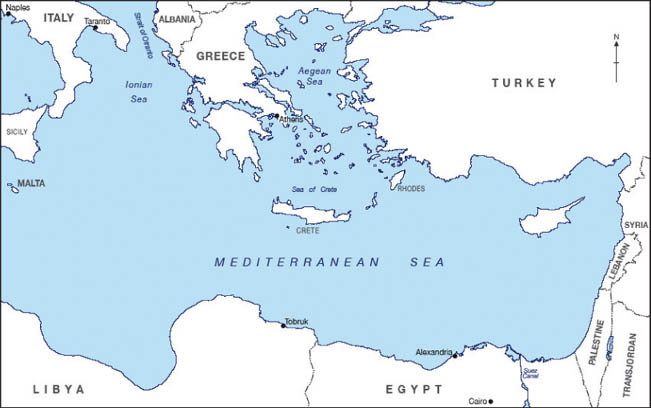
Eastern Mediterranean Theatre
Drawn by Keith Mitchell
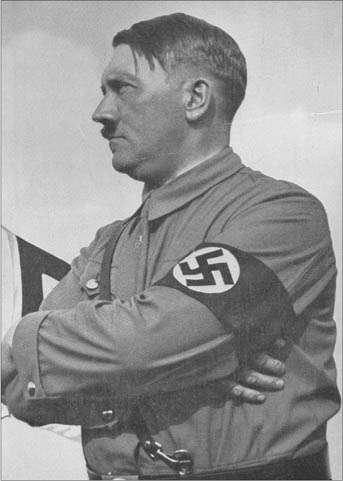
Adolf Hitler, Fhrer of Germany.
Australian War Memorial 044586
ADOLF HITLER
FHRER OF GERMANY
Despite his humble Austrian origins, Adolf Hitler would rise to become one of the most dominant and destructive figures of the 20th century. Hitler initiated the Second World War in a bid to transform Germany into the strongest European power and to vanquish the disgrace of its defeat in the First World War. The result was six years of terrible global violence and racial extermination that almost witnessed the triumph of dictatorship over democracy. Ultimately, however, it was Germany that was destroyed.
Born in Austria in the city of Braunau-on-Inn in 1889, Hitler moved to Munich in 1913. After the outbreak of the First World War he enlisted in the German Army, serving in a Bavarian regiment. He rose to the rank of lance corporal and was awarded the Iron Cross.
After Germanys defeat Hitler returned to Munich where he deepened his exploration of ultra right wing politics and began to expound a political philosophy whose tenets included the enslavement or extermination of lesser races and the rise of Germany to world power status through the use of force. Postwar Germany, racked by hyperinflation, military humiliation, and economic collapse, provided fertile ground for his ideas. In the 1930s Hitlers National Socialist Party began to emerge as a political force on the national stage, enjoying increasing success in nationwide elections. In 1933 he was appointed Chancellor of Germany.
Exploiting the legal powers of the Chancellors office Hitler moved to eliminate his rivals while securing power for himself. In 1934 Hitler took the title of Fhrer or leader. After his renouncement of the restrictions of the Treaty of Versailles, Hitler began the rearmament of Germany and the march to war. Initially, his conquests were secured through diplomatic means, as the leaders of Britain and France chose to appease Hitler rather than risk another Great War. Such effective diplomacy allowed Germany to absorb Austria, Czechoslovakia and Memel, occupy the Saar, and demilitarise the Rhineland.
Next page

